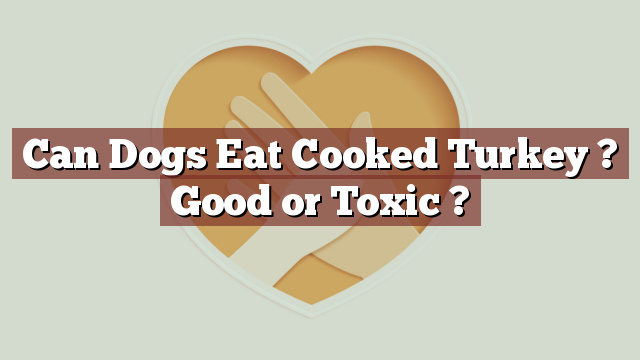Can Dogs Eat Cooked Turkey? Good or Toxic?
Knowing which foods are safe for your dog to eat is crucial to maintaining their overall health and wellbeing. One such food that often comes to mind during the holiday season is cooked turkey. As responsible pet owners, it’s important for us to understand whether cooked turkey is a suitable addition to our furry friends’ diet. In this article, we will delve into the nutritional value of cooked turkey, discuss its safety for dogs, explore potential risks or benefits, and provide guidance on what to do if your dog consumes cooked turkey.
Nutritional Value of Cooked Turkey
Cooked turkey is a lean source of protein that can provide various essential nutrients for dogs. It is rich in vitamins B6 and B12, which help support brain function and maintain a healthy nervous system. Additionally, turkey contains minerals such as zinc, selenium, and phosphorus, which contribute to strong bones, immune function, and cell growth. The protein content in cooked turkey is beneficial for muscle development and repair.
Can Dogs Eat Cooked Turkey? Is it Safe or Toxic?
Yes, dogs can eat cooked turkey. However, it is crucial to ensure that the turkey is plain and free from any seasoning or harmful additives. This includes avoiding turkey cooked with onions, garlic, or excessive amounts of salt, as these ingredients can be toxic to dogs. While plain, cooked turkey is generally safe for dogs to consume, it should be given in moderation and as part of a balanced diet.
Potential Risks or Benefits of Dogs Eating Cooked Turkey
When fed in moderation, cooked turkey can offer various benefits to dogs. As mentioned earlier, it is a great source of protein and contains essential vitamins and minerals. The lean nature of turkey makes it a suitable option for dogs on low-fat diets or those with sensitive stomachs. However, it’s worth noting that some dogs may have allergies or sensitivities to certain proteins, including turkey. If your dog experiences any adverse reactions after consuming cooked turkey, such as vomiting, diarrhea, or skin allergies, it’s best to consult with a veterinarian.
What to Do if Your Dog Eats Cooked Turkey
If your dog manages to sneak a bite of cooked turkey, there are a few steps you can take. Firstly, assess the situation by considering the quantity of turkey ingested and whether it was seasoned or cooked with any harmful ingredients. If your dog consumed a small amount of plain, cooked turkey, it is unlikely to cause any immediate harm. However, if they consumed a large quantity or if the turkey contained toxic seasonings, it is advisable to contact your veterinarian for guidance. They will be able to assess the situation and provide appropriate advice based on your dog’s specific circumstances.
In Conclusion: Cooked Turkey can be Safe for Dogs in Moderation
To summarize, dogs can safely eat cooked turkey as long as it is plain and free from harmful seasonings or additives. Cooked turkey provides valuable nutrients such as protein, vitamins, and minerals. However, it should only be given to dogs in moderation and as part of a balanced diet. If your dog has any underlying health conditions or allergies, it is always best to consult with a veterinarian before introducing new foods to their diet. By being mindful of the portion size and ensuring the turkey is prepared in a safe manner, you can share a delicious and safe treat with your furry companion during special occasions.
Thank you for investing your time in exploring [page_title] on Can-Eat.org. Our goal is to provide readers like you with thorough and reliable information about various dietary topics. Each article, including [page_title], stems from diligent research and a passion for understanding the nuances of our food choices. We believe that knowledge is a vital step towards making informed and healthy decisions. However, while "[page_title]" sheds light on its specific topic, it's crucial to remember that everyone's body reacts differently to foods and dietary changes. What might be beneficial for one person could have different effects on another. Before you consider integrating suggestions or insights from "[page_title]" into your diet, it's always wise to consult with a nutritionist or healthcare professional. Their specialized knowledge ensures that you're making choices best suited to your individual health needs. As you navigate [page_title], be mindful of potential allergies, intolerances, or unique dietary requirements you may have. No singular article can capture the vast diversity of human health, and individualized guidance is invaluable. The content provided in [page_title] serves as a general guide. It is not, by any means, a substitute for personalized medical or nutritional advice. Your health should always be the top priority, and professional guidance is the best path forward. In your journey towards a balanced and nutritious lifestyle, we hope that [page_title] serves as a helpful stepping stone. Remember, informed decisions lead to healthier outcomes. Thank you for trusting Can-Eat.org. Continue exploring, learning, and prioritizing your health. Cheers to a well-informed and healthier future!

